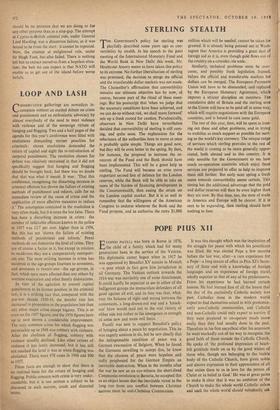STERLING STEALTH
FrFIE Government's policy for sterling was I playfully described some years ago as con- vertibility by stealth. In his speech to the joint meeting of the International Monetary Fund and the World Bank in New Delhi this week, Mr. Heathcoat Amory seems to have taken this policy to its extreme. No further liberalisation of sterling was promised; the decision to merge the official and the transferable dollar markets was not made. The Chancellor's affirmation that convertibility remains our ultimate objective has by now, of course, become part of the ritual of these meet- ings. But his postscript that 'when we judge that the necessary conditions have been achieved, and we can do so without risk, we shall move forward' sets up a fresh record for caution. Paradoxically, observers in New Delhi have nevertheless decided that convertibility of sterling is still com- ing, and quite soon. The explanation for the reluctance of the authorities here to move at once is probably quite simple. Things are good now, but they will be even better in the spring. By then, for instance, the proposal to increase the re- sources of the Fund and the Bank should have been implemented. This will be a great help to sterling. The Fund will become an even more important second line of defence for the London reserves, while the Bank will be able to take on more of the burden of financing development in the CommonWealth, thus easing the strain on the London capital market. But it is as well to remember that the willingness of the American Congress to endorse whatever the Bank and the Fund propose, and to authorise the extra $1,000 million which will be needed, cannot be taken for granted. It is already being pointed out in Wash- ington that America is providing a great deal of foreign aid as it is, even though gold flows out of the country on a considerable scale.
Similarly, technical problems must be over- come, and possibly fresh legislation framed, before the official and transferable markets for dollars can be merged. The European Payments Union will have to be dismantled, and replaced by the European Monetary Agreement, which imposes a stricter discipline on members. The cumulative debt of Britain and the sterling area to the Union will have to be paid off in some way, which will require negotiations with the European countries, and is bound to cost some gold.
The rest of this year, then, will be spent in iron- ing out these and other problems, and in trying to mobilise as much support as possible for sterl- ing as the world's key currency. The unique range of services which sterling provides to the rest of the world is coming to be more generally appre- ciated, both abroad and in this country. It is only sensible for the Government to see how much co-operation countries which enjoy these services are prepared to offer to help to improve them still further. But early next spring a fresh move towards convertibility seems certain. This timing has the additional advantage that the gold and dollar reserves will then be even higher than they are now. By that time, too, the state of trade in America and Europe will be clearer. If it is seen to be expanding, then sterling should have nothing to fear.


































 Previous page
Previous page